Blackmore’s Technique and Opinions (part 2)
Page Played ‘You Really Got Me?!’
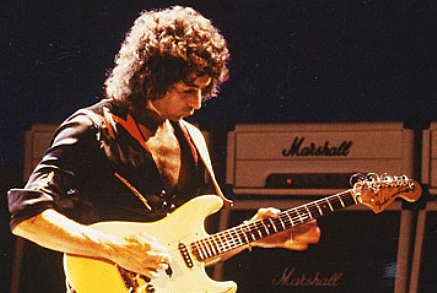
Here’s part 2, the last part for now, of my deep dive into Ritchie Blackmore’s tone. Below Ritchie first talks about his technique, and then he issues opinions on everyone from Yngwie Malmsteen to Jeff Beck (all from the same sources as used in part 1).
Some of his comments are pretty blunt: In interviews he bashed Led Zep, the Stones and Clapton, but said he liked Robin Trower, Robert Fripp and Jeff Beck – not all of them are mentioned below. And he loved (maybe still does) Ian Anderson of Jethro Tull.
But Ritchie is known to be that way – Ritchie is (or was) “mean, moody arrogant, self-obsessed, selfish, insecure and bitter,” according to photographer Ross Halfin’s website. But that was then, so who knows now. And when it comes to his music, none of that matters.
Technique
You started using the vibrato bar extensively on In Rock.
Yes, that’s right. I’d seen the James Cotton Blues Band at the Fillmore East, and the guitarist in the band played with the vibrato bar. He got the most amazing sounds. Right after seeing him, I started using the bar. Hendrix inspired me, too.
You used to give the whammy bar a real workout.
I went crazy with it. I used to have quarter-inch bars made for me because I’d keep snapping the normal kind. My repairman would look at me strangely and say, “What are you doing to these tremolo bars?” Finally, he gave me this gigantic tremolo arm made of half-an-inch of solid iron and said, “Here. If you break this thing, I don’t wanna know about it!”
About three weeks later I went back to the shop. He looked at me and said, “No, you haven’t.” And I said, “Yes I have.” In graphic detail, I explained to him how I would twirl the guitar around the bar, throw it to the floor, put my foot on it and pull the bar off with two hands. He was a bit of a purist, so he wasn’t amused.
Did you ever try a locking-nut tremolo system?
No. I don’t use the twang bar anymore. It’s become too popular.
Between In Rock and Fireball [1971], you switched from Gibsons to Fender Strats. How did that affect your playing style?
It was difficult, because it’s much easier to flow across the strings on a Gibson. Fenders have more tension, so you have to fight them a little bit. I had a hell of a time. But I stuck with the Fenders because I was so taken with their sound, especially when they were paired with a wah-wah.
How did you develop your own unique finger vibrato style?
In my early days, I never used finger vibrato at all. I originally carved my reputation as one of the “fast” guitar players. Then I heard Eric Clapton. I remember saying to him, “You have a strange style. Do you play with that vibrato stuff?” Really an idiotic question. But he was a nice guy about it. Right after that I started working on my vibrato. It took about two or three years for me to develop any technique. Around ’68 or ’69 you suddenly hear it in my playing.
What do you think of tapping [right-handed hammer-ons]?
Thank goodness it’s come to an end. The first person I saw doing that hammer-on stuff was Harvey Mandel, at the Whisky A Go-Go in ’68. I thought “What the hell is he doing?” It was so funny [laughs] – Jim Morrison was carried out because he was shouting abuse at the band. Jimi Hendrix was there. We were all getting drunk. Then Harvey Mandel starts doing this stuff [mimes tapping]. “What’s he doing?” everybody was saying. Even the audience stopped dancing. Obviously Eddie Van Halen must have picked up a few of those things.
What do you think of him?
It depends on my mood. He is probably the most influential player in the last 15 years because everybody’s gone out and bought one of those – what does he play, Charvel, Carvel…
Kramer, with the locking nut.
Yes, with the locking nut! And everyone’s gone hammer-on crazy! So he’s obviously done something. He’s a great guitar player, but I’m more impressed by his recent songwriting and keyboard work. I think he’s going to be remembered. He could be the next Cole Porter.
You do a lot of hammering-on, and frequently put your pick in your mouth and play with your fingers.
I play with my feet also [laughs]. I use my fingers for different sounds and effects. But I actually play very lightly.
How did that light touch come about?
Years ago when I was playing in a bit band, I noticed all these guys with an banjo strings, so I decided to try them. When I did a solo they sounded fine, but when it was over I’d find that the strings would be out of tune. So I started playing lighter out of necessity. Playing a Fender is an art itself anyway. They’re always going out of tune. But the way I play, I’ve got it pretty well under control.
How would you describe your right-hand technique?
It’s up and down, always up and down. People like Alvin Lee play wrong because they play everything down. And it’s so difficult to play like that. It’s a very important technique to have. I often just sit in the dressing room and practice quick up- and down-strokes just changing from one open string to another. And it’s very difficult. The solo from “Highway Star” is that quick up- and down-stroke. The right hand doesn’t really do much, but it sounds very fast. It’s like with a violinist or cellist.
Classical Music
Do you listen to classical music a lot?
Oh, yeah. About three-quarters of the time.
Do you ever go and see it live?
Yeah, I should have gone to the Hollywood Bowl tonight to see a Bach concert. The trouble with that is, once you get hung up on that, it’s hard to relate that to rock. In one respect, you must not forget the roots, which is rock. Obviously, I could never be that good to play classical, but I like to incorporate it. I’m inspired by famous pieces. I mean, I listen very carefully to the patterns that Bach plays. I pick up on certain chord progressions that he uses and I like to use those, which is what we’ve done on the LP a lot.
You also used that type of sequence for the solo on “Highway Star†[Made in Japan].
That’s right. That’s a Bach progression.
The song “Stargazer,” from the second Rainbow album [Rainbow Rising, 1976], has a strong classical feel. How did you come up with that one?
That was a good tune. I wrote that on the cello. I had given up on the guitar between ’75 and ’78. I completely lost interest. I was sick of hearing other guitar players and I was tired of my tunes. What I really wanted to be was Jacqueline Du Prey on cello. So I started playing cello.
What do you think of Yngwie Malmsteen? He’s often credited you as an influence.
He’s always been very nice to me, and I always get on very well with him. I don’t understand him, though – his playing, what he wears. His movements are also a bit creepy. Normally you say, “Well, the guy’s just an idiot.” But, when you hear him play you think, “That guy’s no idiot. He knows what he’s doing.” He’s got to calm down. He’s not Paganini, though he thinks he is. When Yngwie can break all of his strings but one, and play the same piece on one string, then I’ll be impressed. In three or four years, we’ll probably hear some good stuff from him [he said that in 1991].
Three Guys Ritchie Liked (Still Likes?)
On Ronnie James Dio in the early Rainbow days:
I am really enjoying it because of his [Ronnie James Dio] voice. When I played the songs to him, the way he interpreted them was he sings exactly where I would like to sing, if I could sing. The feeling is mutual as a guitar player. And he’s got a really incredible way of getting a song across. I think his lyrics are brilliant. I think his timing is fantastic, his intonation, everything. And it’s so hard to find a very good singer that can do that.
It was always a hardship for me, not so much with Dave [Coverdale] and Glenn [Hughes], but there was always a barrier between the guitar and the vocal. I could never get across really what I wanted. They’d always interpret it their own way. And I thought, “Yeah, that’s good.†We’d put it down and I’d go, “Yeah, it’s okay.†But it was never, “Ah, that was great!†Whereas some of the songs on the [Rainbow] LP, most of them, have turned out exactly how I wanted them. He has an uncanny knack of knowing exactly what I want for some reason. I don’t know how. So at the moment, I’m really pleased with what’s going down.
On Jeff Beck:
Jeff Beck’s great to listen to because he takes a change, and when it comes off it’s so emotional. When he gets feedback going right it’s like an orchestra playing instead of just a guitar, with a lot of brilliant runs.
The real art of chance music is knowing what to do if you don’t get what you tried for. Like if a ballet dancer falls over, it’s knowing how to get out looking clumsy that counts. Beck takes a chance every night. Sometimes, he’s absolutely useless, and you wonder why he’s got a name. Other times he pulls things off that sound like nothing you’ve heard before. He’s one of my favorite guitarist. But taking all those chances is why he gets such bad reviews, sometimes [Beck apparently did get a lot of bad reviews back in the early days].
Jethro Tull is one of your favorite bands?
Say no more. Ian Anderson is a genius, especially with his later stuff. It’s horrifying to think how he wrote that stuff. But if you talk to him, he goes, “Oh, I just count two.” But you can’t count two over that, it’s 9/5 1/2. Their guitarist, [Martin Barre] and the rest of the group have memories like computers to remember that.
Admittedly I wouldn’t like to be in that band playing the same thing every night, but I love to go and see them. I see them at least four times a year. In fact the last time I went and saw them was in Paris, and they put me right in the front row. I thought, “Why do they want me in the front row right in front of Ian Anderson?” So it came to the last number and Ian leaps off the stage and lands in my lap and starts singing to me. The spotlight is on me and I’m trying to act cool because my girlfriend was there.
Whenever he brings out a new, LP I say I hope it’s not as good as the rest of them, because then I’ll feel a little bit better that I can’t write like that. And sure enough, he comes out with another blinder. He gets so involved he writes a symphony.
Funnily enough, we had a blow with them and they were lost: Barrie Barlow, the drummer, can’t keep a straight beat. Martin is fun, he’s got a great memory, but he hasn’t learned to improvise too well I think. He’s got a problem there with his fingers, but he’s still great. You can’t say anything against him because he’s such a nice guy. And John Glascock is a brilliant bass player, the best in the business in rock. Rainbow was after him, but we couldn’t get him. If you get him on his own he’s great and he’s a natural.
Notable
How about this Jimmy Page-related tidbit from Ritchie, talking about the old London studio scene: “‘You Really Got Me,’ by the Kinks, was Jimmy Page because Jon Lord, our organ player, played piano on that session and Dave Davies was nowhere to been seen.”
Category: Edward Van Halen, Jeff Beck, Jimmy Page/Zep, Picking Technique, Ritchie Blackmore, Robin Trower, Yngwie Malmsteen





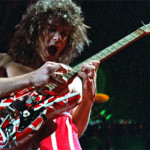
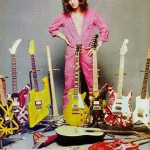

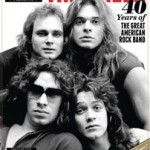
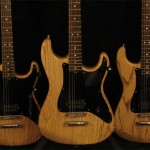


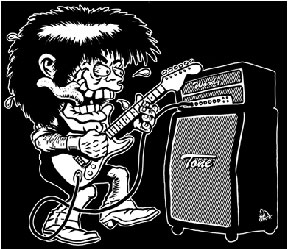

Martin Barre is the guitarist from Jethro Tull not Ian Anderson. He had stated many time he loves that guy's playing. Well written article and very informative BTW. I am a long time deep purple, rainbow fan. Keep up the good work.
Tim